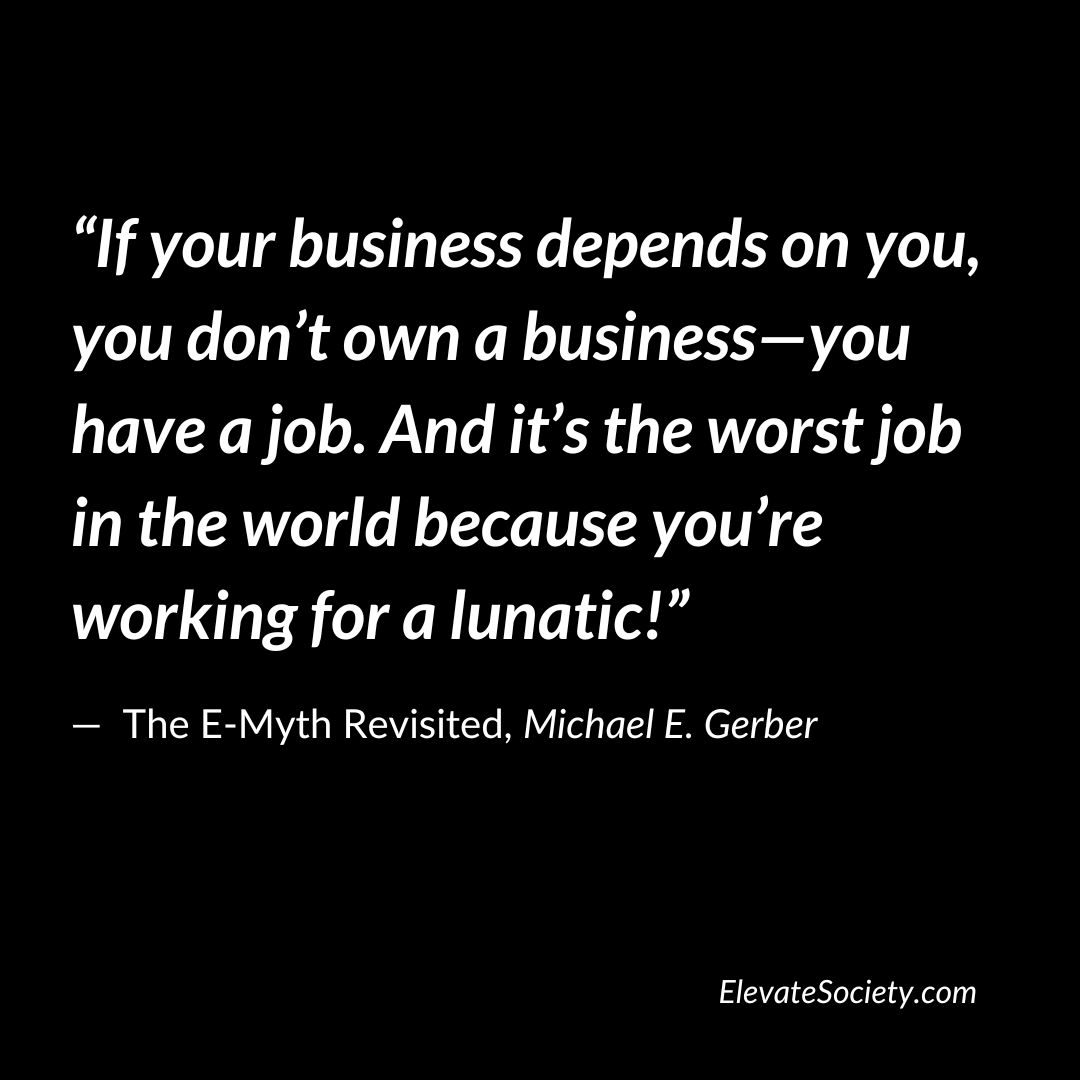If your business depends on you, you don’t own a business—you have a job. And it’s the worst job in the world because you’re working for a lunatic!
What's the meaning of this quote?
Quote Meaning: The quote highlights the importance of building a sustainable and scalable business. This quote implies that if a business relies solely on one person, it limits growth and creates a stressful and unsustainable work environment. It also suggests that working for oneself can be challenging and requires a lot of hard work, but it is worth it in the long run. This quote encourages entrepreneurs to build businesses that can function independently and without them, allowing for more freedom and flexibility.

Who said the quote?
The quote "If your business depends on you, you don’t own a business—you have a job. And it’s the worst job in the world because you’re working for a lunatic!" was said in the book The E-Myth Revisited (Summary / Quotes ) by Michael E. Gerber. Michael E. Gerber is an American author and business consultant who is best known for his book, "The E-Myth Revisited," which focuses on entrepreneurship and small business management.
What's the quote's message?
The message behind this quote sheds light on a fundamental aspect of entrepreneurship, emphasizing the crucial difference between owning a business and merely having a job. The underlying concept challenges the conventional perception of business ownership and presents a stark reality for those who find themselves in the latter position.
The quote suggests that true business ownership entails creating a system that can operate independently, even in the absence of its founder or owner. In contrast, when an enterprise heavily relies on the constant presence and involvement of its creator, it essentially becomes an extension of that individual's job. This notion is significant because it highlights the potential limitations and drawbacks associated with such a setup.
By referring to the situation as "the worst job in the world," the quote captures the inherent frustration and challenges that arise when one becomes entangled in a business that depends entirely on their personal involvement. It implies that the owner becomes a captive to their own creation, forced to bear the burden of constant responsibility and decision-making without respite. Furthermore, the reference to working for a "lunatic" underscores the notion that this arrangement can be mentally and emotionally taxing, akin to laboring under an irrational and demanding boss.
The essence of the message lies in recognizing the importance of building a self-sustaining business, one that can thrive and grow beyond the immediate contributions of its founder. It encourages entrepreneurs to aspire towards creating systems, delegating tasks, and nurturing a capable team that can drive the business forward independently. By doing so, they can liberate themselves from the shackles of an all-consuming job and unlock the true potential of business ownership.
Ultimately, this quote serves as a reminder for aspiring entrepreneurs to pursue a path that goes beyond merely creating a job for themselves. It encourages them to embrace the vision of building something greater—a business that can flourish even when they are not directly involved, allowing them the freedom to explore new opportunities, take breaks, and achieve a more balanced and fulfilling entrepreneurial journey.
Is there a historical example that illustrates the message of the quote?
One historical example that aligns with this message is Henry Ford and the Ford Motor Company. Henry Ford revolutionized the automotive industry and built a successful business empire. However, in the early stages of the company, Ford was heavily involved in all aspects of the business. He controlled production, design, and decision-making, which created a situation where the business heavily depended on him. Ford's strong personality and management style often clashed with his employees and business partners, earning him a reputation as a demanding and difficult boss.
This scenario exemplifies the idea expressed in the quote that when a business relies too heavily on the owner's involvement, it essentially becomes a job rather than a self-sustaining enterprise. In the case of Ford, the company's growth was hindered by the owner-centric approach, as decisions were centralized and bottlenecked by Ford's personal involvement. It was only when Ford implemented more structured and scalable processes, including the development of assembly lines and division of labor, that the company became less reliant on his individual efforts and expanded to become one of the world's largest automobile manufacturers.
By freeing himself from being the sole driving force behind the business, Henry Ford was able to transform the Ford Motor Company into an organization that could operate independently and thrive even in his absence. This historical example serves as a powerful illustration of the message conveyed in the quote, emphasizing the importance of building a business that is not solely dependent on the owner's presence and decision-making.
How can the quote be applied in a real-life scenario?
The quote "If your business depends on you, you don’t own a business—you have a job. And it’s the worst job in the world because you’re working for a lunatic!" by Michael E. Gerber is a poignant reminder of the importance of building a scalable and sustainable business. In a real-life scenario, this quote can be applied to entrepreneurs and small business owners to encourage them to create a business that can thrive independently of their constant presence. Here's how it can be interpreted and applied:
1. Delegation and Systems: To avoid being trapped in a business that depends solely on the owner, entrepreneurs must focus on delegation and implementing efficient systems. By delegating responsibilities and creating well-defined processes, the business can operate smoothly and grow beyond the individual's involvement.
2. Empowering Employees: Building a strong team of capable and motivated employees allows the business to function effectively even when the owner is not around. Empowering employees with training, resources, and decision-making authority fosters a sense of ownership and responsibility.
3. Business Automation: Embracing technology and automation can streamline operations, reducing the dependency on the owner's constant presence. By automating repetitive tasks and utilizing software solutions, the business becomes more efficient and scalable.
4. Creating a Brand Identity: Developing a strong brand identity and culture helps establish the business's reputation and customer loyalty. A business that is well-recognized and respected can continue to thrive even if the owner takes a step back from day-to-day operations.
5. Long-Term Vision: Entrepreneurs should have a long-term vision for their business's growth and sustainability. By planning for the future and anticipating challenges, they can build a business that can weather uncertainties and adapt to changing circumstances.
6. Building a Succession Plan: Preparing a succession plan is essential, especially if the owner plans to step away from the business in the future. Identifying and grooming potential successors or planning for a smooth transition of leadership ensures the business's continuity.
7. Work-Life Balance: Avoiding the "worst job in the world" scenario means striking a healthy work-life balance. By prioritizing personal well-being and avoiding burnout, entrepreneurs can maintain their passion and creativity for the business while also fostering its independence.
In summary, the quote "If your business depends on you, you don’t own a business—you have a job. And it’s the worst job in the world because you’re working for a lunatic!" serves as a wake-up call for entrepreneurs to build a business that can thrive without being overly reliant on the owner's constant involvement. By implementing systems, empowering employees, and creating a sustainable business model, entrepreneurs can avoid the pitfalls of an overly dependent business and instead achieve long-term success and personal fulfillment.

* The editor of this interpretation made every effort to maintain information accuracy. This includes the source and any key ideas or meanings conveyed in it.
Chief Editor
 Tal Gur is an author, founder, and impact-driven entrepreneur at heart. After trading his daily grind for a life of his own daring design, he spent a decade pursuing 100 major life goals around the globe. His journey and most recent book, The Art of Fully Living, has led him to found Elevate Society.
Tal Gur is an author, founder, and impact-driven entrepreneur at heart. After trading his daily grind for a life of his own daring design, he spent a decade pursuing 100 major life goals around the globe. His journey and most recent book, The Art of Fully Living, has led him to found Elevate Society.


























